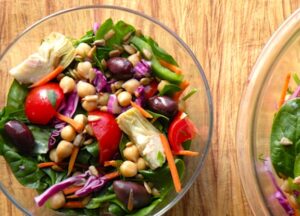Moving to college is a big step and a lot of great things happen while you’re there. Making friends, gaining independence, joining teams and finding a subject that you’re passionate about is easy – what’s hard is staying healthy.
Most college students have very little money to spend on fresh fruits and vegetables, and while there are lots of sports teams, there’s also a lot of late nights partying or cramming in the library. It’s hard to eat clean when buying fast meals from convenience stores and stocking up on coffee and energy drinks. Fortunately, you can avoid a life filled with nothing put pasta and tomato sauce by following these tips.
1. Make Your Own Breakfast
Breakfast food is amongst the cheapest and easiest foods to make. While the cafeteria will have fried and calorific options, that are generally very limited for people on a plant based diet, you can easily store and make healthy hot or cold cereals and almond or soy milk. You can be sure you have a healthy option, that’s affordable, and much more suited to your diet than what’s available in the cafeteria, where eggs and bacon are the main options.
2. Invest In Healthy Snacks
A lot of people assume that’s impossible to keep healthy snacks in a dorm room, as most fruits and vegetables need to be stored in a fridge, and don’t last very long. It can also be extremely expensive to constantly buy fresh produce, which is just not practical for most college students. However, it’s easy to overcome this challenge by buying snacks that are healthy but also cheap and have a long shelf life. Joseph Lewis, a healthcare writer from EssayRoo says that ‘some great ideas to get started are nuts, dried fruit, and crackers. Hummus is a great way to make sure you have some protein handy, and citrus fruits stay fresh for quite a long time, if you feel like having a treat.’
3. Cut the Soda
Sugary drinks may be tempting but they’re so bad for you. Even diet sodas make you bloat, are full of chemicals linked to migraines and weight gain, and leave you feeling terrible. While everyone may need a cup of coffee every now and again, do your best to avoid getting your caffeine from soda. Energy drinks are even worse, and can even lead to heart problems, so just get into the habit of drinking water and tea as much as you can.
4. Stick to the Salad Bar
A lot of people in college are on a dining or meal plan. This can be pretty restrictive for vegans and vegetarians, and a lot of the options are particularly unhealthy. It’s easy for vegans to end up filling up on bread, fries, potatoes, and pasta, which has almost no nutritional value, and can also lead to weight gain. Jessica Crawley, an education writer with Boom Essays advises that ‘most college meal plans include a salad bar. Heading straight to this area means you can fill up on fresh produce, vegetables, and proteins like chickpeas and legumes. You can really build a solid meal from this part of the cafeteria; all it takes is some will power to walk past the fries and pasta.’
5. Listen to Your Body
While you were living at home, you probably had a much more stable schedule, and a lot less variables to consider like feeling hungover, or studying way into the night. You may find yourself eating at weird hours, or snacking at night time – it’s OK. Habits change as your lifestyle changes, and it’s OK to find your own rhythm and not stick to the same rules you used to.
While it may not be as simple as when you lived at home, it’s totally possible to stay healthy and happy while you’re at college.
Mary Walton is an online editor and writer, she blogs at Simple Grad. There you may find lots of tips for students on improving education. Also, she is a proofreader at UK dissertation service. Having a degree in creative writing Mary tutors students online. She enjoys running, she plans to run a marathon next year.






David W says
Thanks for sharing. This is nice blog.